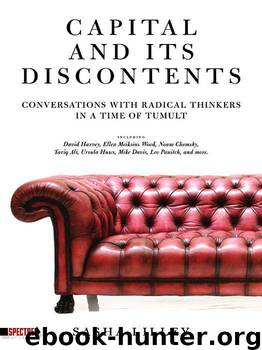Capital and Its Discontents: Conversations with Radical Thinkers in a Time of Tumult (Spectre) by Lilley Sasha

Author:Lilley, Sasha [Lilley, Sasha]
Language: eng
Format: mobi
Publisher: Independent Publishers Group
Published: 2010-11-01T05:00:00+00:00
You argue that in history crises, both precapitalist and capitalist, have been resolved by plunder—by expansion into new frontiers as well as technical innovation—although under capitalism the speed and intensity of these processes has been accelerated. You suggest that land productivity has beenof central importance to precapitalist societies, whereas labor productivity is central to capitalist society. What’s the basis of that distinction and why is it relevant in understanding the current crisis?
JWM: This distinction between the productivity of land and the productivity of labor is really one of the central dividing points between capitalism and other historical systems that we’ve known. The only thing that capital values is labor productivity. It’s not so much that capital ignores nature. It divides nature in this profoundly alienating and explosive way—sometimes creative, sometimes destructive, usually both. The danger is always that the biophysical well-being of watersheds or of soils and many other aspects of ecological life, that those are sacrificed simply to raise the number of bushels produced per person per hour.
How I talk about this in “Ecology and the Accumulation of Capital” is that there has always been, and capitalism is in a sense defined by, this very close connection between what I call productivity and plunder. On the one hand, there are all these extraordinary technological innovations that have raised the productivity of labor power, of human nature. The steam engine is probably the greatest example of this. On the other hand, all of these innovations, without exception, have been premised on the plunder of nature. This is at the core of many discussions of fossil capitalism today—that when you take coal out of the ground or natural gas or oil out of the ground, it is being used to raise the productivity of labor.
So when people—and very many good people on the left—talk about the possibilities of a technological fix to today’s problems, what they are doing is taking one part of this twin process and saying technology can do everything now. Well, technology has never done everything. In fact, technology, if we think of the great sort of epoch-making technologies of the modern world—the railroads of the nineteenth century, the automobile of the twentieth century—these were inventions that only existed through the massive conquest of global nature. It’s really important to put these two things together.
And let me just put one other idea out there to think about. The rising labor productivity over the course of the modern world has been paired with a rising toxicity of the global environment. Every phase of capitalism is not just more productive in terms of human nature, not just more voracious of extra-human nature, but also more toxic. By this I don’t simply mean there’s more pollution, that more coal is burned, that more oil is burned, so there are more pollutants in a general sense in the atmosphere and the air that we breathe. I mean that what we see from the earliest moments of capitalism are new kinds toxic effluents that radically transform the existing socio-ecological order.
Download
This site does not store any files on its server. We only index and link to content provided by other sites. Please contact the content providers to delete copyright contents if any and email us, we'll remove relevant links or contents immediately.
International Integration of the Brazilian Economy by Elias C. Grivoyannis(110694)
The Radium Girls by Kate Moore(12018)
Turbulence by E. J. Noyes(8040)
Nudge - Improving Decisions about Health, Wealth, and Happiness by Thaler Sunstein(7694)
The Black Swan by Nassim Nicholas Taleb(7111)
Rich Dad Poor Dad by Robert T. Kiyosaki(6613)
Pioneering Portfolio Management by David F. Swensen(6289)
Man-made Catastrophes and Risk Information Concealment by Dmitry Chernov & Didier Sornette(6007)
Zero to One by Peter Thiel(5789)
Secrecy World by Jake Bernstein(4742)
Millionaire: The Philanderer, Gambler, and Duelist Who Invented Modern Finance by Janet Gleeson(4469)
The Age of Surveillance Capitalism by Shoshana Zuboff(4279)
Skin in the Game by Nassim Nicholas Taleb(4240)
The Money Culture by Michael Lewis(4198)
Bullshit Jobs by David Graeber(4179)
Skin in the Game: Hidden Asymmetries in Daily Life by Nassim Nicholas Taleb(3993)
The Dhandho Investor by Mohnish Pabrai(3760)
The Wisdom of Finance by Mihir Desai(3735)
Blockchain Basics by Daniel Drescher(3574)
